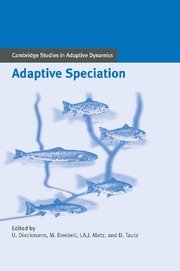Book contents
- Frontmatter
- Contents
- Contributing Authors
- Acknowledgments
- Notational Standards
- 1 Introduction
- 2 Speciation in Historical Perspective
- A Theories of Speciation
- B Ecological Mechanisms of Speciation
- C Patterns of Speciation
- 15 Phylogeography and Patterns of Incipient Speciation
- 16 Evolutionary Diversification of Caribbean Anolis Lizards
- 17 Adaptive Radiation of African Montane Plants
- 18 Diversity and Speciation of Semionotid Fishes in Mesozoic Rift Lakes
- 19 Epilogue
- References
- Index
16 - Evolutionary Diversification of Caribbean Anolis Lizards
Published online by Cambridge University Press: 05 July 2014
- Frontmatter
- Contents
- Contributing Authors
- Acknowledgments
- Notational Standards
- 1 Introduction
- 2 Speciation in Historical Perspective
- A Theories of Speciation
- B Ecological Mechanisms of Speciation
- C Patterns of Speciation
- 15 Phylogeography and Patterns of Incipient Speciation
- 16 Evolutionary Diversification of Caribbean Anolis Lizards
- 17 Adaptive Radiation of African Montane Plants
- 18 Diversity and Speciation of Semionotid Fishes in Mesozoic Rift Lakes
- 19 Epilogue
- References
- Index
Summary
Introduction
The diversification of the lizard genus Anolis on Caribbean islands surely represents one of the best-studied cases of adaptive radiation in evolutionary biology. Over the course of the past four decades, researchers have studied almost every aspect of anole evolutionary ecology. These include systematics; community, physiological, and behavioral ecology; functional morphology; ethology; and demography. Studies have been conducted in the laboratory and in the field, and have included basic natural history, geographic and temporal comparisons of populations, and a wide variety of experimental approaches to the study of phenotypic plasticity, ethology, ecology, and evolution [recent reviews include Losos (1994) and Roughgarden (1995)]. The result is an unusually broad and detailed understanding of the factors that promote and sustain evolutionary diversification and species coexistence.
Speciation and adaptation in anoles
Two conclusions from the current body of work are obvious. First, the genus Anolis has experienced extensive speciation. With more than 400 described species, and more being described every year, Anolis is the largest amniote genus, exceeded among tetrapods only by the potentially para- or polyphyletic frog genus Eleutherodactylus. The nearly 150 Caribbean species are descendants from as few as two initial colonizing species from the mainland (Jackman et al. 1997). Hence, the diversity of Caribbean species results almost entirely from speciation, rather than from repeated colonization.
Second, adaptive diversification has been rampant. Within assemblages of anoles, species are clearly specialized to occupy different niches. Physiological and functional studies have revealed evidence for adaptation to particular microclimatic and structural habitats. Moreover, intraspecific comparisons indicate that populations adapt to their particular environmental conditions (reviewed in Malhotra and Thorpe 2000).
- Type
- Chapter
- Information
- Adaptive Speciation , pp. 322 - 344Publisher: Cambridge University PressPrint publication year: 2004
- 8
- Cited by



